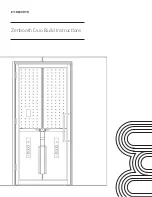
2-1
SECTION 2. TEMPERATURE MEASUREMENT
2.1 GENERAL
The vibrating wire probe includes a thermistor
which is used to measure the temperature of
the probe. Probe temperature is used to correct
errors in the vibrating wire measurement
caused by changes in the temperature of the
probe. The temperature correction is most
important when the temperature of the medium
the probe is measuring is changing (e.g. water
temperature in a river or shallow lake). When
concerned with the absolute reading, it is also
important to make the temperature correction if
the medium temperature differs from the
calibration temperature. In a deep well where
the water temperature does not change, the
error due to temperature can be removed by
allowing the sensor to come to thermal
equilibrium and adjusting the sensor reading to
read the correct depth by means of an offset.
2.2 ACCURACY AND RESOLUTION
The accuracy of the temperature measurement
is a function of the following factors listed in
decreasing importance:
1)
the thermistor's
interchangeability,
2)
the resistance of the wire,
3)
the linearization error,
4)
the precision of the
bridge resistors,
5)
the accuracy of the
datalogger's voltage measurement, and
6)
the
temperature coefficient of the bridge resistors.
The interchangeability of the thermistor is
±
0.5
o
C although a thermistor with
±
0.2
o
C
interchangeability is an option. The error due to
wire resistance is normally less than
±
0.5
o
C
(see Figure 2.2-1 through 2.2-4). The
linearization error is
±
0.15
ο
C (see Figure 2.2-5)
over the range from -5 to +60
o
C. The precision
of the bridge resistors (
±
0.1%) results in a
tolerance of
±
0.03
o
C. The accuracy of the
datalogger's voltage measurement (
±
0.015%)
results in a tolerance of
±
0.01
o
C. The
temperature coefficient of the bridge resistors
(10 ppm/
o
C) results in a tolerance of
±
0.0003
o
C/
o
C.
Errors four, five, and six mentioned above are
all less than
±
0.03
o
C each and can probably be
ignored. The wire resistance is primarily an
offset error and its affect on the pressure
measurement is removed by the initial
calibration. Errors caused by the change in wire
resistance due to temperature, thermistor
interchangeability, and the linearization error are
not removed by the initial calibration.
Ignoring the offset errors, the remaining
temperature accuracy is expected to be about
±
0.7
o
C. The temperature correction for the
vibrating wire measurement is typically less than
0.05 psi/
o
C. A
±
0.7
o
C temperature error would
result in a 0.035 psi (±
1
.0 inch H2O) error on a
50 psi Full Scale range.
The thermistor, Dale Electronics part number
1C3001-B3 is the standard with an
interchangeability of
±
0.5
o
C. The optional
thermistor, Dale Electronics part number
1C3001-C3 has an inter-changeability of
±
0.2
o
C. Both of the above thermistors have the
same resistance vs. temperature relationship as
the YSI thermistor number 44005.
The following table shows the relationship
between temperature and resistance, volts,
CR10 output, and linearization error.
TABLE 2.2-1. Temperature vs. Thermistor Resistance, V,
o
C, and Linearization Error
SENSOR
TEMP
RESISTANCE,
VOLTS
CR10
ERROR
o
C
OHMS
OUT
OUTPUT,
o
C
o
C
-5
12700
0.668449
-5.09136
-0.09136
-4
12050
0.692520
-4.02248
-0.02248
-3
11440
0.716743
-2.98315
0.016846
-2
10860
0.741399
-1.95557
0.044427
-1
10310
0.766400
-0.93843
0.061560
Summary of Contents for AVW1
Page 20: ...AVW1 AVW4 4 4 This is a blank page...
Page 24: ...AVW1 AVW4 5 4 This is a blank page...
Page 25: ...A 1 APPENDIX A PRESSURE CONVERSION CHART...
Page 26: ...This is a blank page...
Page 27: ...B 1 APPENDIX B SCHEMATICS AND STUFFING CHARTS FOR AVW1 AND AVW4...
Page 28: ...APPENDIX B SCHEMATICS AND STUFFING CHARTS FOR AVW1 AND AVW4 B 2...
Page 29: ...APPENDIX B SCHEMATICS AND STUFFING CHARTS FOR AVW1 AND AVW4 B 3...
Page 30: ...APPENDIX B SCHEMATICS AND STUFFING CHARTS FOR AVW1 AND AVW4 B 4...
Page 31: ...APPENDIX B SCHEMATICS AND STUFFING CHARTS FOR AVW1 AND AVW4 B 5...
Page 32: ...APPENDIX B SCHEMATICS AND STUFFING CHARTS FOR AVW1 AND AVW4 B 6 This is a blank page...
Page 34: ...This is a blank page...
Page 35: ...This is a blank page...








































